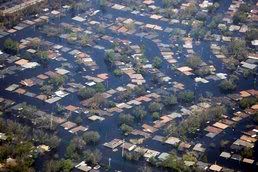Timeshare Resales After Katrina
Friday, September 2, 2005
In the wake of the biggest disaster in recent memory, the timeshare industry confronts challenges, but also affords timeshare resale opportunities.

Four days after hurricane Katrina hit Louisiana, the situation along the Gulf Coast of the United States is particularly dire. The city of New Orleans may never recover fully from this disaster. The long-term economic implications are still being calculated, and widespread repercussions are already being felt. Most shocking of all is the loss of human life on such a massive scale, and the horrifying ordeals faced by those still trying to survive in this city. Anyone reading this is encouraged to help relief efforts by any means necessary.
In lodging and hospitality industry news, Marriott International Inc. was arguably the first hotel company to respond to this tragedy. Marriott had temporarily shut down about 20 hotels in Louisiana and Alabama. In interviews, spokesman John Wolf described no severe structural damages to Marriott properties in affected areas.
Other hotel chains have yet to provide information about damages. We all remember the terrifying stories and photos of the Hyatt Regency in New Orleans, which was slammed by both high winds and flying debris.
Most feel that Katrina has been the latest installment in what is clearly an abnormally destructive hurricane season. Clearly, many people are having second thoughts about owning property in an area vulnerable to hurricanes, even if these areas are prime resort destinations, like Central Florida.
Normally, after an area has been hit hard by a hurricane, it undergoes a period of redevelopment. Timeshare resort developments are no different: the affected area can undergo dramatic renovations and upgrades in the weeks and months following a hurricane. Consequently, with upgraded amenites, remodeled resorts are able to sell new timeshares for higher prices, and charge higher fees on existing ones.
Immediately after a major hurricane strikes a high-demand resort area, the timeshare resale market typically sees a dramatic influx of timeshares for sale. If these units are located in a resort damaged by a large storm, the timeshares in question cannot be assumed to be structurally sound. Timeshare owners often advertise storm-damaged properties for as little as $50.00/week. Sometimes owners can be less than forthcoming about the condition that their properties are in, so due diligence is a must when purchasing a timeshare resale under these circumstances.
Buying timeshare resales at a storm-damaged resort facility is largely contingent upon whether or not the resort plans on redeveloping the property. The idea is to buy a unit at a minimal cost while demand is still low, obtaining it before timeshare sale prices rise. Please keep in mind that some resorts are still rebuilding after the 2004 hurricane season, which caused widespread damages all over Florida.
What many people don’t realize is that hidden costs can materialize out of thin air. Rising property taxes are a likely consequence of a natural disaster. The maintenance fees at the new resort will be higher than they were previously, and the resort company may even assess special fees to cover hurricane damages. Typically, a special hurricane assessment can cost owners $800.00 – $1200.00. Still, if a timeshare cost $50.00 initially, the average timeshare owner can absorb the rising costs and still save thousands of dollars off the original price asked by the resort for the unit in question, just by buying a timeshare resale at minimal cost.
In this manner, many timeshare buyers try to take advantage of the opportunities on the resale market. If you plan on buying damaged property at bargain prices, make sure you know exactly what you are getting into before you sign a contract!


